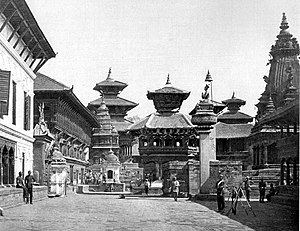| Bhaktapur Durbar Square | |||||||||||||
|---|---|---|---|---|---|---|---|---|---|---|---|---|---|
Khwopa Lāyekū (Newar) | |||||||||||||
 General view of the central part of the square before the 1934 earthquake. | |||||||||||||
 | |||||||||||||
| General information | |||||||||||||
| Architectural style | Nepalese Architecture | ||||||||||||
| Location | Bhaktapur, Nepal | ||||||||||||
| Coordinates | 27°40′19″N 85°25′41″E / 27.672027°N 85.428108°E | ||||||||||||
| Construction started | 14th century | ||||||||||||
| Owner | Bhaktapur Municipality | ||||||||||||
| Website | |||||||||||||
| https://bhaktapurmun.gov.np/en | |||||||||||||
| |||||||||||||
Bhaktapur Durbar Square (Nepal Bhasa: 𑐏𑑂𑐰𑐥 𑐮𑐵𑐫𑐎𑐸 Nepali: भक्तपुर दरबार क्षेत्र) is a former royal palace complex located in Bhaktapur, Nepal. It housed the Malla kings of Nepal from 14th to 15th century and the kings of the Kingdom of Bhaktapur from 15th to late 18th century until the kingdom was conquered in 1769. Today, this square is recognised by UNESCO, managed jointly by the Archeological Department of Nepal and Bhaktapur Municipality, and is undergoing extensive restoration due to the damages from the earthquake in 1934 and the recent earthquake of 2015.[1]
The Durbar Square is a generic name for the Malla palace square and can be found in Kathmandu and Patan as well. The one in Bhaktapur was considered the biggest and the grandest among the three during its independency but now many of the buildings that once occupied the square has been lost to the frequent earthquakes.[2] During its height, Bhaktapur Durbar Square contained 99 courtyards but today hardly 15 of these courtyards remain.[2] The square has lost most of its buildings and courtyards to frequent earthquakes, particularly those in 1833 and 1934 and only a few of the damaged buildings were restored.
Detailed information and pictures can be found in : https://www.bhaktapur.com/
- ^ Bhaktapur Durbar Square nepalandbeyonhlooArchived January 8, 2013, at the Wayback Machine
- ^ a b Vaidya 2002, p. 2.